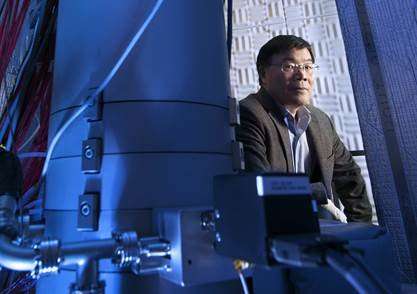Oxide materials discovery may advance electronic device development

Materials scientists at the University of California, Irvine and other institutions have made a breakthrough discovery in the study of oxide heterostructures, substances that have the potential to revolutionize advanced electronics, memory technologies and photovoltaics.
In an article published today in Nature Nanotechnology, the researchers report the direct observation of an anisotropic conductance at a ferroelectric–insulator interface.
Using scanning probe and transmission electron microscopy techniques, the team found that conduction along the interface shows strong directionally dependent behavior with respect to the orientation of striped ferroelectric domains in the bismuth ferrite thin film on a terbium scandate substrate. The interface conducts when the measurement is made parallel to the 109° domain stripes but insulates when measured in a perpendicular direction.
According to the corresponding author Xiaoqing Pan, Irvine Materials Research Institute director and UCI professor of materials science & engineering, this property is advantageous in that it allows modulation of conductivity through polarization switching, enabling unprecedented control of multiple degrees of freedom and facilitating the design of new functionalities in microelectronics.
"Although our work focuses on this bismuth ferrite material, this knowledge can be extended to similar ferroelectric systems," he said. "We believe our results will open a possibility of realizing new ferroelectric-based devices, which would function in a substantially different way than current technologies."
More information: Yi Zhang et al. Anisotropic polarization-induced conductance at a ferroelectric–insulator interface, Nature Nanotechnology (2018). DOI: 10.1038/s41565-018-0259-z
Journal information: Nature Nanotechnology
Provided by University of California, Irvine



















